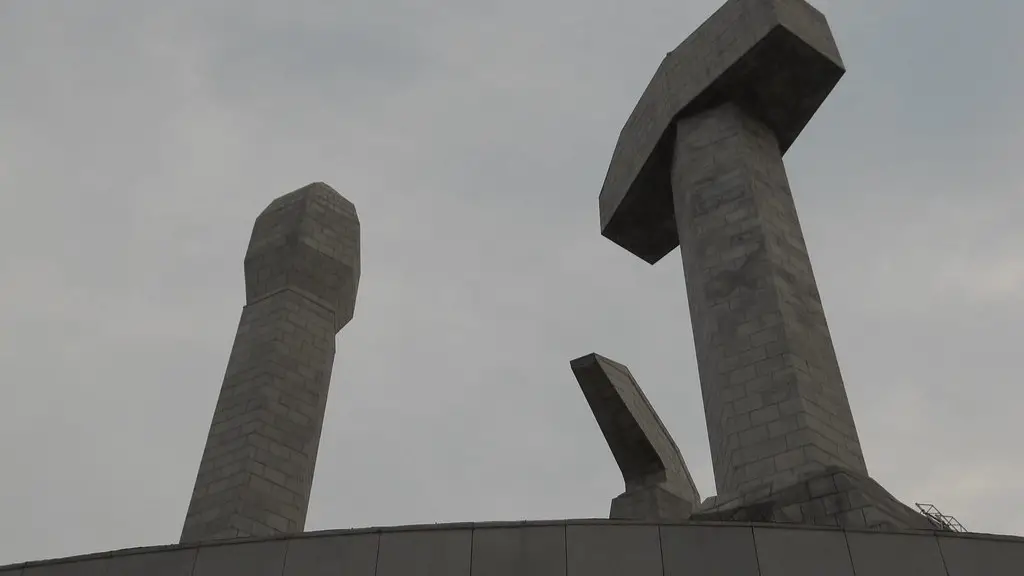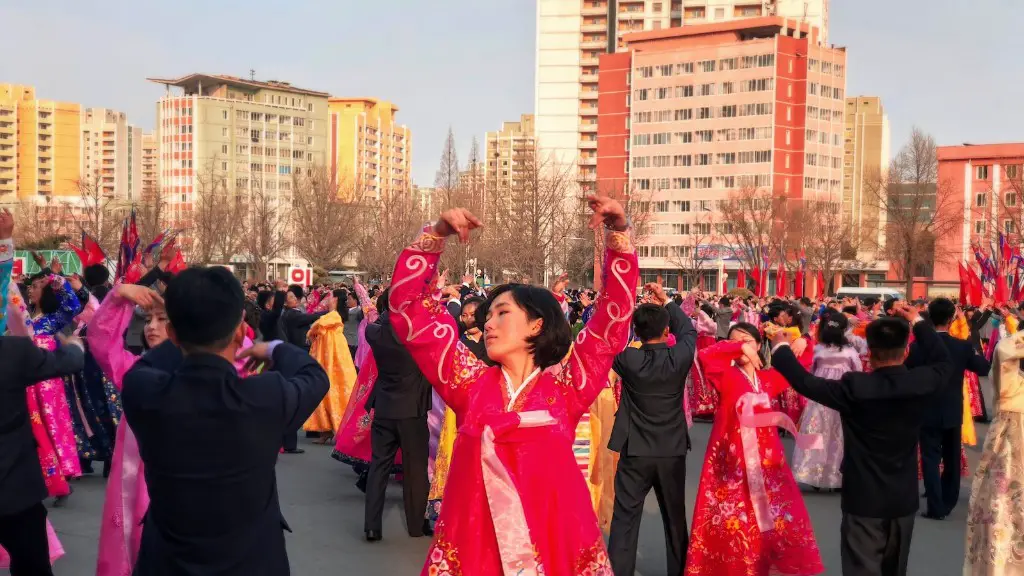War has been a familiar concept in human history, with many nations engaging in them to protect their political and economic interests. North Korea, as a small yet combative nation, has caused many fears and apprehensions throughout the years. Despite its earlier efforts to become a powerful nation, the country has remained isolated and is subject to numerous international sanctions. The question has often been brought up as to whether a war with the North Korean state is likely.
The tensions between North Korea and the outside world have become increasingly hostile in the past few years. In recent times, North Korea has been developing its nuclear capabilities, a source of fear for many countries in the region. In addition, the country has also been testing ballistic missiles, further raising the alarm among its neighbours. There is no doubt that the current situation is precarious, and the threat of conflict is looming.
Some experts argue that a war is unlikely, due to the North Korean government’s lack of resources and strength. North Korea, despite its nuclear capabilities, cannot match the might of the United States, or its allies. In addition, the country’s leaders are aware of their own limitations, and thus unlikely to engage in an open conflict. Furthermore, any such aggression would have massive implications for the North Korean people and the region.
At the same time, there is also the possibility that tensions could escalate and result in a war. North Korea’s leaders are unpredictable and willing to defy international sanctions and norms. In addition, the US has maintained a hardline stance towards the country, and any provocations from the North Korean side may lead to a dangerous confrontation. Moreover, there is a strong possibility of a miscalculation by either side, which could further lead to a military confrontation.
It is clear that the threat of a war between North Korea and the US is a very real possibility. While the current situation may seem stable, the volatile nature of the region and the leaders of the two countries could trigger an open conflict. As a result, it is advisable to maintain vigilance and be aware of the potential dangers that may arise.
What Are The Potential Consequences of War?
If a war with North Korea were to happen, it would undoubtedly have dire consequences for the entire region. The most visible impact would be the destruction of human lives, impacting not just North Korea but also its neighbours and other nations around the world. There would also be economic ramifications, with the international community likely to be hit by a deep recession. In addition, the war would have a severe environmental cost, with the use of nuclear weapons having wide-reaching impacts.
The political implications of such a war would also be far-reaching. The US and other superpowers may gain more influence, while regional powers like China and Russia may be weakened. In addition, weaker countries may struggle to remain independent, while strong alliances may be formed. All this would lead to a significantly changed global power structure, with far-reaching consequences.
It is also important to consider the psychological impact of such a situation. The events prior to and during a war are often met with fear, sorrow and anger. This could, in turn, lead to unpredictable consequences, and the people of the region would be affected enormously. In addition, a war could act as a catalyst for further unrest, and result in long-term instability.
What Are The Alternatives To War?
In light of the potential consequences of a war between North Korea and the US, it is important to consider alternative ways of solving the issue. One approach is that of negotiation and dialogue, with both sides looking to discuss the situation in a calm and measured manner. This could allow the two sides to find a mutual understanding, and hopefully pave the way for a peaceful resolution. Such an approach requires time and effort, but could bring more productive results than a rush to war.
Another possibility is that of economic sanctions and other measures designed to bring the North Korean state to heel. The international community can use its financial and other influence to put pressure on North Korea, with the aim of forcing it to abandon its nuclear ambitions. This has been attempted in the past with mixed results, and could help to reduce tensions if applied correctly.
Finally, it is important to remember that the North Korean state is fundamentally different from other nations in the world. It has its own unique culture, history and political structure, and understanding this can help to prevent a conflict. By providing economic assistance, offering diplomatic support and avoiding hostile rhetoric, it may be possible to prevent a war from occurring.
How Does The World React To War Threats?
The international community has, for the most part, reacted with caution to the threats of war. The United Nations has repeatedly called for an end to hostilities, and have been involved in attempts to facilitate dialogue between North Korea and the US. Regional powers like China and Russia have also stepped in, and maintained a balanced approach in the dispute.
In addition, the public opinion in many countries has been largely in favour of peace. This is seen, for example, in public protests and discussions around the world, with many emphasising the need for dialogue and diplomacy. This is a sign that war, while possible, is far from an ideal situation.
It is also worth noting that some countries have maintained a tough stance towards North Korea. The United States, for example, has maintained a hardline policy, and has imposed several economic sanctions against the country. Other nations have followed suit, and there has been growing pressure on North Korea from various superpowers.
What Can We Do To Prevent War?
In order to prevent a war between North Korea and the US, it is important to consider what can be done at the individual level. A good starting point is to raise awareness about the issue, and to make sure that the public is informed of the potential consequences. This could lead to greater public pressure on governments, and pave the way to a calm resolution of the situation.
Individuals can also take actions to support peace. This could involve actively supporting peacebuilding efforts, such as donating money to aid projects or volunteering with peace initiatives. It could also involve speaking out against war and violence, as well as engaging in debates surrounding the issue. Such actions can help to increase public pressure, and contribute towards the prevention of future conflict.
Finally, it is important to remember that most wars are ultimately caused by governments and leaders. To prevent a war from breaking out, individuals can pressure their own governments to pursue peaceful solutions to international disputes. This could involve writing letters to government officials, attending protests or mobilising public opinion. These efforts can contribute to a better outcome for all involved.
What Are The Regional Implications?
The potential of a war between North Korea and the US not only affects the two countries involved, but also has major implications for the entire world. As mentioned, the economic and environmental impact would be severe, while the political repercussions would be wide-reaching. In addition, it is likely that the region would suffer greatly, and could be subject to further instability.
For example, it is likely that the geopolitical landscape of East Asia would completely change. Regional powers like China and Japan, for example, may be forced to take sides, which could lead to new alliances and further tensions. In addition, other countries such as South Korea and Taiwan may be impacted too, as a result of a shifting power balance.
Other issues to consider include the refugee crisis that may ensue, as well as the potential for conflict spillover into other regions. There are also potential implications in terms of human rights, with millions of North Koreans subject to oppression and violations of their civil liberties. Given the complexity of the situation, it is important to take into consideration all the regional implications of a potential war.
What Are The International Implications?
Should a war break out, it is likely that the entire world would be affected. For one, the potential for nuclear escalation could impact the entire planet, leading to severe environmental and health impacts. In addition, the political and economic repercussions would be wide-reaching, with the situation likely to push many countries into a deep recession.
On a different level, there could be long-term implications for the international system. With the US and other superpowers involved, the balance of power may be significantly altered. This could lead to a shift away from the current structure, and could ultimately result in a more dangerous world. Countries may be less willing to cooperate, and conflicts may become more common.
In addition, the morality and ethics of war may also come into question. The use of nuclear weapons, for example, is highly controversial and raises serious issues of human rights and justice. Such weapons may have an irreparable impact on the environment, and countries may be less willing to engage in open conflict in the future.
What Are The Implications On The North Korean People?
It is important to not forget that a potential war would have the most severe implications on the North Korean people. With millions of civilians in the country, the use of weapons of mass destruction could have devastating effects on the population. People would be displaced, their rights violated, and their lives forever changed.
Furthermore, there is the psychological impact of a war to consider. The events preceding and during a conflict can leave an indelible mark on people. The trauma of war can, in some cases, be passed on to future generations, and the impact on the North Korean people could be significant.
Finally, it is worth considering the possibility of a population exodus. In the event of a war, it is likely that many people would attempt to leave the country, resulting in an influx of refugees. This could have implications for the region, and may lead to long-term instability.





